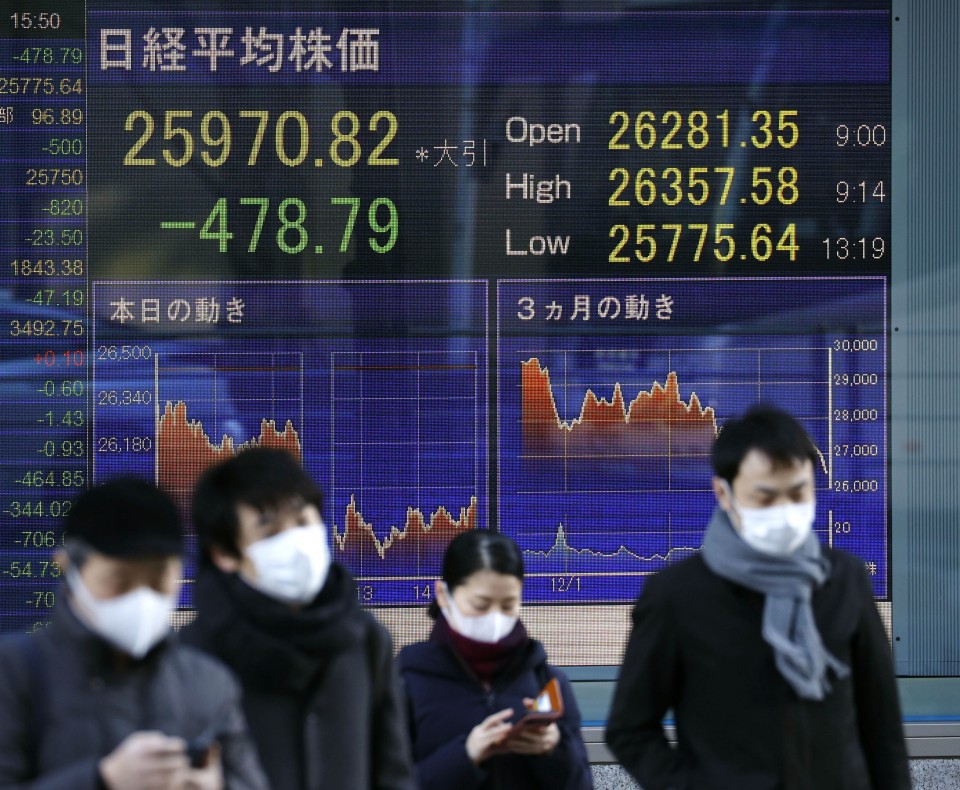The Nikkei stock index plunged on Thursday, falling below 26,000 for the first time since November 2020, as Russia launched a major attack against Ukraine, raising concerns over the outlook for energy prices and the impact on the global economy.
The 225-issue Nikkei Stock Average ended down 478.79 points, or 1.81 percent, from Tuesday at 25,970.82, its lowest closing level since Nov. 20, 2020. Japanese financial markets were closed Wednesday for a national holiday. The broader Topix index of all First Section issues on the Tokyo Stock Exchange finished 23.50 points, or 1.25 percent, lower at 1,857.58.
Investors fled to government bonds, the yen and other safe-haven assets as Russia launched what Kyiv called “a full-scale invasion” following Russian President Vladimir Putin’s announcement to carry out a “special military operation” in eastern Ukraine.

A financial board in Tokyo shows the Nikkei Stock Average closing below 26,000 on Feb. 24, 2022. (Kyodo)
The yield on the benchmark 10-year Japanese government bond inched down 0.005 percentage point from Tuesday’s close to 0.185 percent. Bond yields move inversely to prices.
The U.S. dollar fell to the mid-114 yen range from around the 115 yen line.
At 5 p.m., the dollar fetched 114.61-62 yen compared with 114.95-115.05 yen in New York at 5 p.m. Wednesday.
The euro was quoted at $1.1245-1246 and 128.88-92 yen against $1.1299-1309 and 129.98-130.08 yen in New York late Wednesday afternoon.
Meanwhile, the Russian ruble plummeted to a record low against the U.S. dollar, according to Reuters.
Tokyo stocks extended a losing streak to five sessions as the market remained under pressure on Ukraine concerns. The Nikkei index plunged in the afternoon, briefly losing over 600 points.
Crude oil prices soared due to expectations that Moscow’s military action would lead to disruption of oil supplies from Russia. Benchmark Brent crude futures briefly surpassed $100 per barrel for the first time since September 2014.
“Market participants turned risk-averse following the reports. As uncertainties remain over the situation, the Nikkei index could lose further ground following new developments,” said Shingo Ide, chief equity strategist at NLI Research Institute.
Ide said that investors are worried that continuing geopolitical tensions could spur inflation due to a further increase in crude oil prices.
Related coverage:
Russia launches “full-scale invasion” of Ukraine, sparks int’l outcry
Japan PM vows to work with G-7 as Russia decides on Ukraine operation
Japan to impose sanctions on Russia amid Ukraine crisis: PM Kishida
“Investors are worried that higher energy prices could cool the economy. Another concern is that the U.S. Federal Reserve may tighten its monetary policy drastically to battle a possible rise in inflation,” Ide said.
Putin’s announcement of a “special military operation” in eastern Ukraine came amid Western countries’ last-minute pleas to prevent a war in the heart of Europe.
Major stock markets worldwide have been hit by fears over a large-scale Russian invasion and its impact on the global economy, with the Dow Jones Industrial Average extending its losing streak to five days on Wednesday.
On the First Section, declining issues outnumbered advancers 1,294 to 824, while 64 ended unchanged. Decliners were led by air transportation, rubber product and glass and ceramics issues.
Rubber product issues were weak on concerns that higher raw material costs would adversely impact the rubber industry’s revenues.
Yokohama Rubber sank 80 yen, or 4.7 percent, to 1,615 yen, and Bridgestone fell 266 yen, or 5.4 percent, to 4,682 yen.
Some technology-related shares fell on losses on the U.S. Nasdaq index, brokers said. Industrial robot maker Fanuc fell 1,160 yen, or 5.4 percent, to 20,255 yen, and semiconductor maker Screen Holdings lost 590 yen, or 5.4 percent, to 10,320 yen.
Trading volume on the main section rose to 1,594.12 million shares from Tuesday’s 1,138.93 million shares.
George is Digismak’s reported cum editor with 13 years of experience in Journalism
